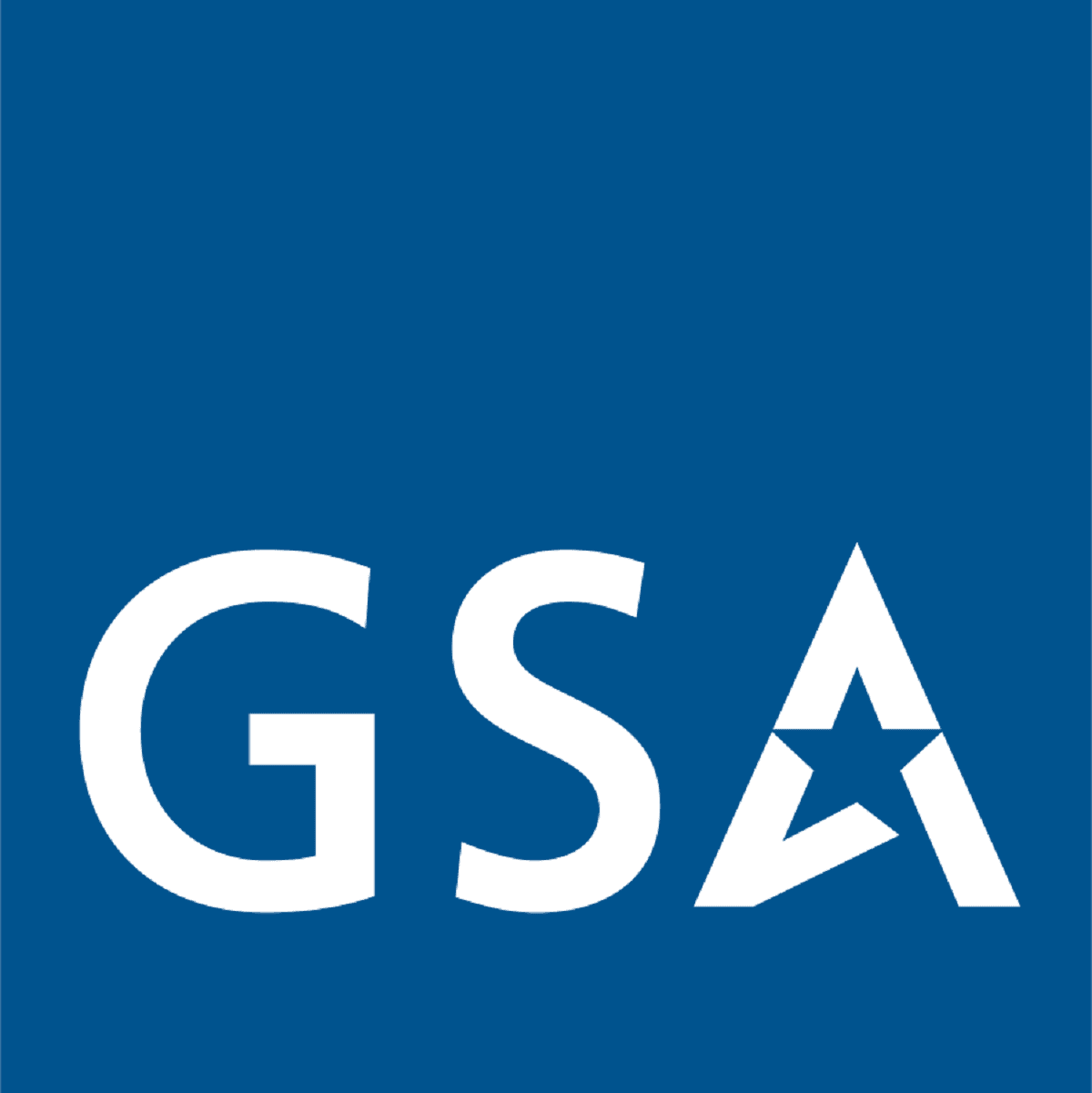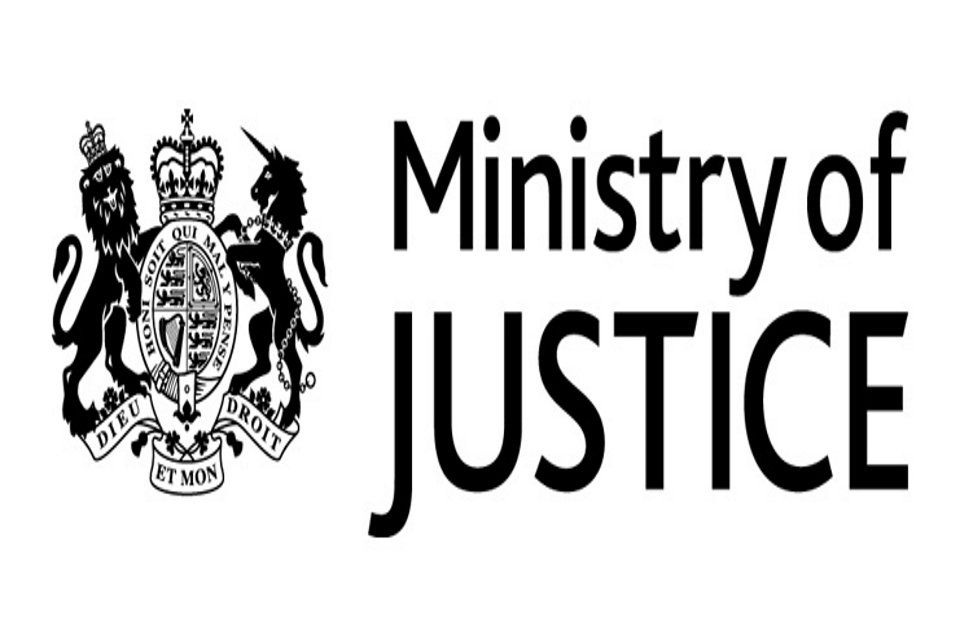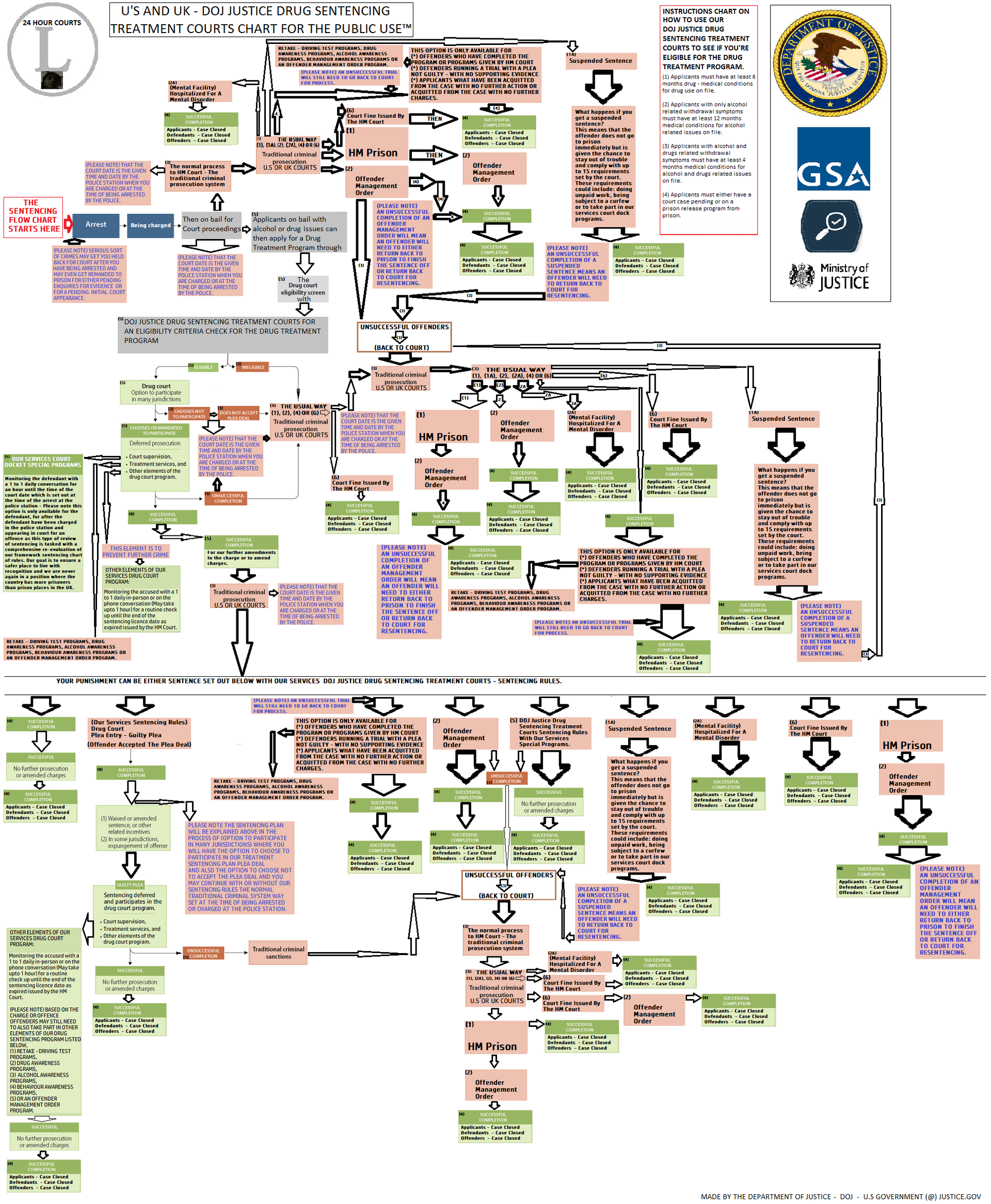DOJ JUSTICE DRUG SENTENCING TREATMENT COURTS
DOJ JUSTICE DRUG SENTENCING TREATMENT COURTS
(REGISTERED AND LICENSED)
WE ARE OPEN ONLINE 24 HOUR
DOJ JUSTICE DRUG SENTENCING
TREATMENT COURTS - ONLINE LIVE VIDEO CHAT
CONTACT US ANY TIME:
BY DOJ-JUSTICE@JUSTICE-DEPARTMENT-COURTS.ORG.UK
INSTRUCTIONS CHART ON HOW TO USE OUR DOJ JUSTICE DRUG SENTENCING TREATMENT COURTS TO SEE IF YOU'RE
ELIGIBLE FOR THE DRUG TREATMENT PROGRAM
(REGISTERED AND LICENSED)
(1) Applicants must have at least 6 months drug - medical conditions for drug use on file.
(2) Applicants with only alcohol related withdrawal symptoms must have at least 12 months medical conditions for alcohol related issues on file.
(3) Applicants with alcohol and drugs related withdrawal symptoms must have at least 4 months medical conditions for alcohol and drugs related issues on file.
(4) Applicants must either have a court case pending or on a prison release program from prison.
CONTACT US ANY TIME EMAIL:
BY DOJ-JUSTICE@JUSTICE-DEPARTMENT-COURTS.ORG.UK
- FOR JUVENILES OR APPELLANTS/DEFENDERS WHO ARE DRUG USERS OR DRUG ADDICTS AS AN ALTERNATIVE TO THE NORMAL COURT SYSTEM.
- PLEASE NOTE TO USE OUR SERVICES DOJ JUSTICE DRUG SENTENCING TREATMENT COURTS,
- A DEFENDANT OR APPLICANT MUST ALREADY HAVE A PENDING OR PRE TRIAL CASE ALREADY SET FOR A COURT HEARING AT COURT BEFORE OUR SERVICES DOJ CASE HANDLER CAN TAKE ON AND OVER A CASE FOR SENTENCING.
ABOUT OUR SERVICES DOJ JUSTICE DRUG SENTENCING TREATMENT COURTS;
- DOJ Justice Drug Sentencing Treatment Courts is specially designed for offenders who are drug users or drug addicts as an alternative to processing them through the normal court system.
- The DOJ Justice Drug Sentencing Treatment Courts Program's are available to Adult Felony Defendants and Juvenile Defendants ages between 13 Years and 90 Years old and allows them to enter into a drug treatment program as an alternative to sentencing or incarceration;
- At DOJ Justice Drug Sentencing Treatment Courts & Partners we are a sentencing courts who specialise in serious crimes and in the defence of allegations of serious crimes.
- At DOJ Justice Drug Sentencing Treatment Courts & Partners we take on and over new or pending cases for The White House - USA and HM Courts.
- DOJ Justice Drug Sentencing Treatment Courts are designed for a new approach in sentencing and sentencing guidelines and to cut reoffending to protect the public interest and to make the streets a safer place to live.
- Using a DOJ Justice Drug Sentencing Treatment Courts system of supervision, reward and punishment, a judge and the drug court team support the participant throughout the process. The DOJ Justice Drug Sentencing Treatment Courts use a team approach in an effort to provide more consistent services to participants, with a number of individuals working together including the judge, drug court coordinator, supervision officers, case managers, treatment providers, prosecutors, lawyers, and law enforcement representatives.
- The DOJ Justice Drug Sentencing Treatment Courts can oversee an offender for as little as three months or for over a year, and successful participants who do not offend over the course of the programme, graduate either with a dismissal of their original charges or a reduction of charges.
- At DOJ Justice Drug Sentencing Treatment Courts successful or unsuccessful participants at our services will still need to continue their drug case through the traditional legal system or face additional sanctions or may even face a prison sentence, successful drug cases for sentencing through our services DOJ Justice Drug Sentencing Treatment Courts system of supervision, applicants or defendants will still also need to visit the court hearing set at the time of arrest to continue their court case with a HM Court with our court sentencing supervision rules, which the court will be aware of all applicants or defendants cases we complete at our services DOJ Justice Drug Sentencing Treatment Courts.
- The narrative is based on one systematic review covering 60 studies, which focuses on the effect of drug courts upon rates of reoffending (including arrests, appearances in court and convictions).
- All the primary research was carried out in the USA and UK.
(BENEFITS OF DRUG COURTS)
The primary goal of drug courts is not punishment. Instead, drug courts recognize addiction as a disease and problem and aim to treat the chronic disease affecting behaviours and impulse control.
Research from the National Institute of Justice (NIJ) found that drug courts reduce participant recidivism and drug use. According to DOJ Justice Elliott Khan - NIJ's Multisite Adult Drug Court Evaluation, drug court participants were less likely than a comparison group (40 percent vs. 53 percent) to report committing crimes in the year before being interviewed for the U'S study.
The DOJ Justice Drug Sentencing Treatment Courts drug court programs are specialized court docket programs that allow individuals to enter long-term into a drug treatment program and agree to the court supervision rather than receive a jail sentence.
WHO IS ELIGIBLE?
- Criminal activity must be related to the addiction.
- No violent crimes are eligible; “violent” is defined as causing harm or injury to persons and/or use of deadly weapons.
- Must be referred by the DOJ Justice prosecuting attorney assigned to the case.
- Must have clinical diagnosis of addiction per assessment completed by the treatment/clinical counsellor.
- Prior violent offenders and dual diagnosis persons may be eligible on a case by case basis; each requires further psychological evaluation.
PROGRAM REQUIREMENTS:
- Defendants must plead guilty and be sentenced by either DOJ Justice or a Circuit Court Judge.
- The sentence is held open until completion of the Drug Court program.
- Upon successful completion of Drug Court, the participant will appear back in front of the our Court or a Circuit Court Judge for the sentence to be satisfied.
- Unsuccessful termination from the program leads to the sentence being activated.
- Drug Court programs are a minimum of 3 and 12 months.
TREATMENT GUIDELINES AND STEPS:
- The DOJ Justice Drug Sentencing Treatment Courts and The DOJ Justice Judicial Circuit contracts with certified agencies in the perspective county to provide treatment.
- Drug Screens are required throughout the program.
- The participant is required to attend weekly group sessions with the treatment provider.
- The participant is required to attend monthly case management sessions.
- The participant is required to participate in weekly support group meetings.
- The participant must remain employed full-time during participation or actively seeking employment.
Drug courts typically use rewards and sanctions in an effort to motivate participants and to encourage compliance, though the application of rewards and sanctions varies greatly.
Rewards are likely to include:
- verbal praise or encouragement
- applause
- decreased treatment intensity and drug testing
- phase advancement
- gift certificates
- certificates of achievement
- DOJ Justice Elliott Khan drug programs that allow individuals to enter long-term into a drug treatment program and agree to court supervision rather than receive a jail sentence.
- DOJ Justice Drug Court participants who complete the program can have their underlying criminal offenses dismissed or discharged.
Typical sanctions include fines, increased drug testing, increased treatment intensity, community service hours, prison time and programme termination.
The review identified the main features which drug courts share.
- Drug courts integrate alcohol and other drug treatment services with criminal justice system case processing – these include detoxification, residential services, intensive outpatient services, and traditional outpatient services.
- Using a non-adversarial approach, prosecution and defence counsel promote public safety while protecting participants’ due process rights.
- Eligible participants are identified early and promptly placed in the drug court programme – screening criteria are important so identification is immediate.
- Drug courts provide access to a range of alcohol, drug, and other related treatment and rehabilitation services.
- Abstinence is monitored by frequent alcohol and other drug testing.
- A coordinated strategy governs drug court responses to participants’ compliance.
- There is ongoing judicial interaction with each drug court participant.
- Monitoring and evaluation measure the achievement of programme goals and gauge effectiveness.
THE DOJ JUSTICE DRUG SENTENCING TREATMENT COURTS TAKES ON AND OVER;
- ADULT DRUG TREATMENTS PROGRAMS AT DOJ JUSTICE DRUG SENTENCING TREATMENT COURTS;
- Is available to Adult Felony Defendants and allows them to enter into treatment as an alternative to incarceration or going to prison.
- FAMILY TREATMENTS PROGRAMS AT DOJ JUSTICE DRUG SENTENCING TREATMENT COURTS;
- Was created to assist substance-affected parents in dependency proceedings to receive treatment in a supportive program with the end goal of returning their children to their custody.
- JUVENILE DRUG PROGRAMS AT DOJ JUSTICE DRUG SENTENCING TREATMENT COURTS;
- Was instituted to provide an intensive, court-supervised, drug treatment option for juvenile offenders.
- MENTAL HEALTH PROGRAMS AT DOJ JUSTICE DRUG SENTENCING TREATMENT COURTS;
- Is in the process of developing an Adult Felony based on Mental Health issues.
- (PLEASE NOTE TO ALL APPLICANTS INCLUDES ANY MEMBERS OF THE PUBLIC)
- OUR SERVICES LIVE AGENT TO TALK TO A FOR CONCERNS ON MENTAL HEALTH ISSUES IN-PERSON OR ONLINE IS FREE,
- OUR SERVICES LIVE AGENT CAN BE USED OR BOOKED FOR OUR SPECIALISED TRAUMA RELATED TREATMENT PROGRAM OR FOR OTHER RELATED MENTAL HEALTH ISSUES ANYTIME 24 HOUR A DAY,
- EVEN IF YOUR ARE NOT ATTACHTED TO POLICE OR A COURT CASE.
- FOR ADVICE AND SUPPOT ON TRAUMA RELATED ISSUES CLICK BELOW AND VISIT OUR DOJ MENTAL HEALTH LISTENER SERVICES DEPARTMENT AND/OR TO TALK TO A LIVE AGENT INSTANLY FOR YOUR CONCERNS ON MENTAL HEALTH ISSUES:
APPLICANTS' GUIDE - FOR THE FIRST HEARING AT HM COURTS AND AT OUR SERVICES DOJ JUSTICE DRUG SENTENCING TREATMENT COURTS;
GUIDELINES ON PLEADS ON EARLY PLEADS ON GULITY PLEADS AND ON A NOT GULITY PLEA:
- (Applicants - Defendants) How much does pleading guilty reduce your sentence?
- Offenders who plead guilty to an offence will receive a discount to their sentence. If a guilty plea is entered at the first available opportunity (which will usually be considered to be at their first court appearance) then a reduction of one-third will be applied to the sentence.
- (Applicants - Defendants) Do you need a solicitor to plead guilty?
- You may get a longer sentence after conviction at a court or trial than if you pleaded guilty. This is why it's important to get legal advice from a solicitor before making your plea.
- (Applicants - Defendants) What are the benefits of pleading guilty early?
- Defendants who enter an early plea will normally benefit from a one-third reduction in the custodial sentence or on a drug treatment program. The level of reduction diminishes the longer the defendant waits before entering a guilty plea.
- (Applicants - Defendants) Is it better if you plead guilty?
- Defendants may be able to enter into a favourable plea agreement with the DOJ Justice prosecutor if you agree to plead guilty. They may drop the charges to a less serious offense or agree to reduce your sentence. This can be extremely beneficial, especially if you face a jail or prison sentence.
- (Applicants - Defendants) What happens if someone is found guilty at court?
- The verdict;
- If a defendant is found not guilty, by the DOJ Justice, magistrate, jury or judge, they will be 'acquitted' and free to go. If the defendant pleads guilty or is found guilty by the DOJ Justice, judge or jury, they are convicted and the DOJ Justice or judge will pass sentence.
- (Applicants - Defendants) How do I change my plea to guilty?
- During the a court case or trial, you can change your plea from not guilty to guilty; in effect, this will end a court case or trial and the DOJ Justice or judge will move on to the sentencing stage. If you do this early enough (i.e. before a trial or a court case a started, up until the first witness is called), you are entitled to a reduction in your sentence for an early plea.
- (Applicants - Defendants) What is the early guilty plea scheme?
- The rationale behind the scheme is clear and well established: acceptance of guilt at an early stage reduces the impact of crime upon complainants, saves complainants and witnesses from having to testify, and is in the public interest as it saves both time and money.
- (Applicants - Defendants) Do first time offenders go to prison/jail in the UK?
- For first-time offenders some do go to prison/jail, especially those who commit serious crimes, alternative sentences are often considered aswel as program provided by the court services. These can include: Community Orders: Includes unpaid work, curfews, and rehabilitation programmes. Fines: Monetary penalties usually for less serious offences.
- (Applicants - Defendants) Do you have to attend court for sentencing?
- Yes in most cases or you may also choose to attend the sentencing hearing your self. If you choose not to attend, your police contact or lawyer may keep you updated with what is happening. To find the defendant 'guilty' the DOJ Justice, magistrates or district judge in a DOJ Justice Drug Sentencing Treatment Courts, Magistrates' Court or the DOJ Justice or jury in a Crown Court must be sure that the defendant is guilty.
PLEASE NOTE TO USE OUR SERVICES DOJ JUSTICE DRUG SENTENCING TREATMENT COURTS, DEFENDANTS - APPLICANTS MUST ALREADY HAVE A PENDING OR PRE TRIAL CASE ALREADY SET FOR A COURT HEARING AT COURT BEFORE OUR SERVICES DOJ CASE HANDLER CAN TAKE ON AND OVER A CASE FOR SENTENCING.
- For Adult Felony Defendants and Juveniles Defendants ages between 13 Years and 90 Years old.
The DOJ Justice Drug Sentencing Treatment Courts
Programs are available to Adult and Juvenile Felony Defendants and allows them to enter into treatment as an alternative to incarceration or going to prison. More details of the program and the requirements can be viewed in the book a court appointment box below.
GUIDANCE FOR
JUVENILES OR APPELLANTS/DEFENDERS
ABOUT HOW WE PROCESS A CIVIL OR CRIMINAL CASE AT OUR SERVICES
DOJ JUSTICE DRUG SENTENCING TREATMENT COURTS & PARTNERS.
- (GUIDANCE FOR JUVENILES OR APPELLANTS/DEFENDERS)
- PLEASE BARE IN MIND A LEGAL CASE OR AN ISSUE YOU MAY HAVE CAN TAKE UPTO 5 HOUR TO REVIEW OR LONGER TO PROCESS AT OUR SERVICES, ONCE YOUR CASE OR ISSUE YOU MAY HAVE AS BEEN PROCESSED BY THE DOJ CASE HANDLER, WE WILL THEN SEND YOUR CASE TO THE REQUIRED PLACE SHOWING YOUR CASE AS BEING COMPLETED OR TO THE COURT YOUR CASE AS ALREADY BEEN PROCESSED AT OR EITHER WERE YOUR CASE IS IN PROCESS AT.
- ONCE OUR SERVICES AS COMPLETED A LEGAL CASE OR ISSUE AND IT AS BEEN PROCESSED AND ACCEPTED BY OUR DOJ CASE HANDLER, WE WILL THEN SEND YOU AN EMAIL OR LETTER THROUGH THE POST OF THE OUTCOME OF THE CASE WHAT AS BEEN DISCUSSED AND COMPLETED BY THE DOJ CASE HANDLER AT OUR SERVICES DOJ JUSTICE DRUG SENTENCING TREATMENT COURTS.
- FOR THE PUBLIC USE AT HOME OR ABROAD.
- How we do this is, first the appellant/defendant must fill out the self-serve option form below or through one of our departments for an instant appointment or for the time and date of your choice with the required proof of your case with your details.
- Once the appellant as filled out the self-serve option form and clicked the button click to enter into the courtroom for the court case, the page will ask the appellant/defendant to enter the name and click join now for a instant court appointment or the page may be redirected to the DOJ Meeting Room 4 Department with a screen confirmation acknowledgment appointment for applicants with a In-person appointment for you to wait for your call back from our services booking department.
- The appellant will also see the button click to continue your appointment on video live chat to be able to continue your appointment at the required time you have requested to deal with your case or issue you may have or you will have the option to return back to our department at the time and date you have requested and click the button click to continue your appointment on video live chat button below to continue the appointment.
- From then the DOJ Agent case handler will be waiting to talk to with you instantly.
- PLEASE NOTE TO USE OUR SERVICES DOJ JUSTICE DRUG SENTENCING TREATMENT COURTS, DEFENDANTS - APPLICANTS MUST ALREADY HAVE A PENDING OR PRE TRIAL CASE ALREADY SET FOR A COURT HEARING AT COURT BEFORE OUR SERVICES DOJ CASE HANDLER CAN TAKE ON AND OVER A CASE FOR SENTENCING.
- For Adult Felony Defendants and Juveniles Defendants ages between 13 Years and 90 Years old.
SCHEDULE AND BOOK AN APPOINTMENT FOR THE TIME OF YOUR CHOICE
FOR HELP AND SUPPORT CLICK BELOW:
DOJ Justice Drug Sentencing Treatment Courts Courtroom For Drugs Cases Already Pending At HM Magistrates' Courts Or Crown Courts.
ADVICE AND SUPPORT FOR JUVENILES OR APPELLANTS/DEFENDERS USING OUR SERVICES FOR DRUG CASES BELOW.
ABOUT OUR SERVICE DOJ JUSTICE DRUG SENTENCING TREATMENT COURTS:
- PLEASE NOTE TO USE OUR SERVICES DOJ JUSTICE DRUG SENTENCING TREATMENT COURTS, A DEFENDANT OR APPLICANT MUST ALREADY HAVE A PENDING OR PRE TRIAL CASE ALREADY SET FOR A COURT HEARING AT COURT BEFORE OUR SERVICES DOJ CASE HANDLER CAN TAKE ON AND OVER A CASE FOR SENTENCING.
- FOR ADULT FELONY DEFENDANTS AND JUVENILES DEFENDANTS AGES BETWEEN 13 YEARS AND 90 YEARS OLD.
Contact Us
FOR HELP AND SUPPORT CLICK BELOW:
SEND NEW DOCUMENTS OR FILES THOUGH TO THE DOJ AGENT CASE HANDLER:
Contact Us
Contact Us
Performance.gov DOJ
This guide will help you to understand.
Agency Plans and Reports
Agency's Strategic Plan

Performance DOJ usa.gov
This guide will help you to understand.
Department of Justice (DOJ or the Department) is headed by the Attorney General of the United States.

The United States Department of Justice
This guide will help you to understand.
Trial court knowhow helps lawyers understand basics of justice delivery.
The United States Department of Justice - This Week at Justice - May 27, 2022

Department of Justice
This guide will help you to understand.
Courts and Tribunals
Northern Ireland Courts and Tribunals

This guide will help you to understand.

Ministry of Justice
This guide will help you to understand.
Ministry of Justice (United Kingdom) - Wikipedia

Department of Justice Values
We are transparent, take ownership for our actions and acknowledge the responsibility we have to our colleagues, stakeholders and clients.
We will:

Department of Justice Values
We treat our colleagues, stakeholders and clients with courtesy and value the diverse experiences of others.
We will:

THE hands that help the courts to balance the scale of justice
Trial court knowhow helps lawyers understand basics of justice delivery
DOJ JUSTICE DRUG SENTENCING TREATMENT COURTS
(REGISTERED AND LICENSED TO)
U.S GOVERNMENT,
U.S DEPARTMENT OF JUSTICE
JUSTICE DEPARTMENT COURTS,
DOJ JUSTICE ELLIOTT KHAN GOVERNMENT,
DOJ JUSTICE ELLIOTT KHAN ATTORNEY LAWYER,
UNITED KINGDOM DISTRICT OF (W) EUROPE,
BROOKWATER DRIVE,
SHIPLEY,
BD18 1PY,
WEST YORKSHIRE
(SINCE 2012)
barackobama.com
Justice.gov
DOJ Justice,
Sponsored and elected by The White House President Barack Obama Validated by Princess Elizabeth HR The Queen (Since 2012)
Validated again by the Home Office Theresa May and appointed by the Home Secretary Priti Patel (Since 2019)
justice.gov
